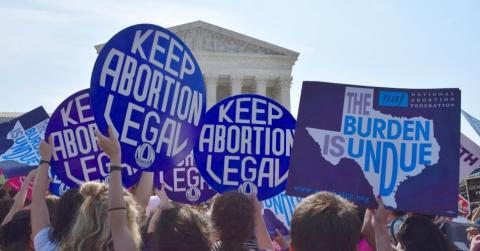The significance of Monday's landmark Supreme Court decision on abortion is already being felt across the nation, giving women's health advocates reason to hope that the concerted right-wing assault on reproductive rights has been "stopped in its tracks."
On Tuesday, the Supreme Court rejected appeals from Mississippi and Wisconsin seeking to put in place admitting-privilege restrictions similar to those struck down in Whole Women's Health v. Hellerstedt. Mississippi's law would have closed the lone abortion clinic in the state.
"Today's decision should send a loud signal to anti-abortion politicians that they can no longer hide behind sham rationales to shut down clinics and prevent a woman who has decided to end a pregnancy from getting the care she needs," said Larry Dupuis, legal director of the American Civil Liberties Union of Wisconsin, which represented an abortion clinic in the Wisconsin case.
"Whether in Mississippi, Texas, or any other state across the U.S., politicians cannot insert their personal beliefs into a woman’s decision whether to continue or end a pregnancy," added Nancy Northup, president and CEO of the Center for Reproductive Rights, which filed the Mississippi lawsuit in 2012. "We are confident that courts across the country will continue to affirm that politicians cannot pass laws attacking women’s access to safe, legal abortion."
Additionally, late on Monday, Alabama's Attorney General Luther Strange said his office will drop its appeal in a similar case because of Monday's ruling, admitting "there is no good faith argument that Alabama's law remains constitutional in light of the Supreme Court ruling."
According to the Center for Reproductive Rights, similar admitting-privilege requirements—for which the Supreme Court could find no medical justification—are in effect in Missouri, North Dakota, Utah, and Tennessee, and are on hold in Kansas, Louisiana, and Oklahoma. The surgical-center standards that the Court also struck down are in place in Michigan, Missouri, Pennsylvania and Virginia, and are on hold in Tennessee.
"We are currently looking at all avenues to invalidate those two restrictions in the state of Missouri," president and CEO of Planned Parenthood of Kansas and Mid-Missouri Laura McQuade said in a conference call with reporters on Monday.
"As the news in Alabama, Wisconsin, and Mississippi shows, yesterday’s landmark ruling was just the beginning," said Cecile Richards, president of the Planned Parenthood Federation of America. "This decision has opened the door to go state by state, legislature by legislature, law by law, and restore access to safe, legal abortion."
Indeed, as author and columnist Jessica Valenti wrote on Monday:
The ruling represents a significant loss for anti-abortion groups, who have been pushing Targeted Regulation of Abortion Providers (Trap laws) over the last decade: as of this year, 24 states have some sort of law or policy that restricts abortion access through targeting the way providers work.
But the Whole Woman’s Health decision – which laid bare the way that these mandates constitute an undue burden on women seeking abortion – stands to put that years-long strategy in jeopardy. It will be that much harder for anti-choice legislators to shroud their policies in rhetoric about protecting women when the highest court in the country has essentially called the tactic nonsense.
Furthermore, as Politico wrote on Tuesday, "The decision's political ramifications are significant. It will galvanize both sides of the divisive abortion debate as the presidential campaign builds toward the national party conventions, and intensify the political focus on the Supreme Court's vacancy, which has been frozen in the Senate. The Whole Women's Health decision is sure to be cited as the two sides in the debate remind voters that the next president will almost certainly name several justices to the bench, providing a rare opportunity to cement the court's political stance for years to come."
While both Hillary Clinton and Bernie Sanders praised the Supreme Court ruling on Monday, GOP frontrunner Donald Trump "has gone into hiding," as Planned Parenthood Action Fund political communications director Erica Sackin said on Tuesday. Trump, who earlier this year suggested women who have abortions should be "punished," has thus far stayed silent on Monday's decision.


Spread the word